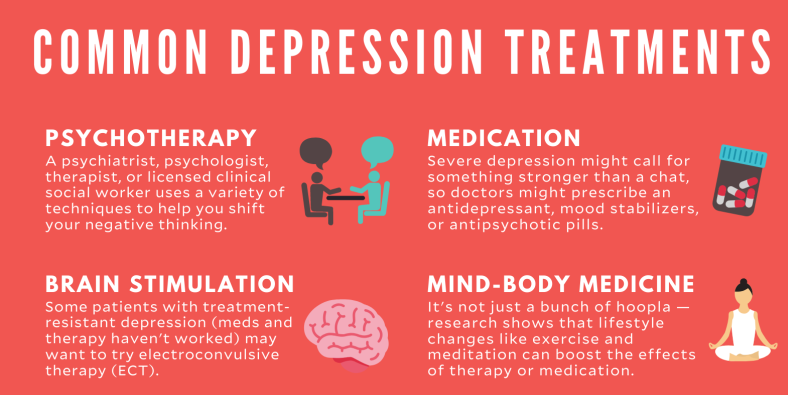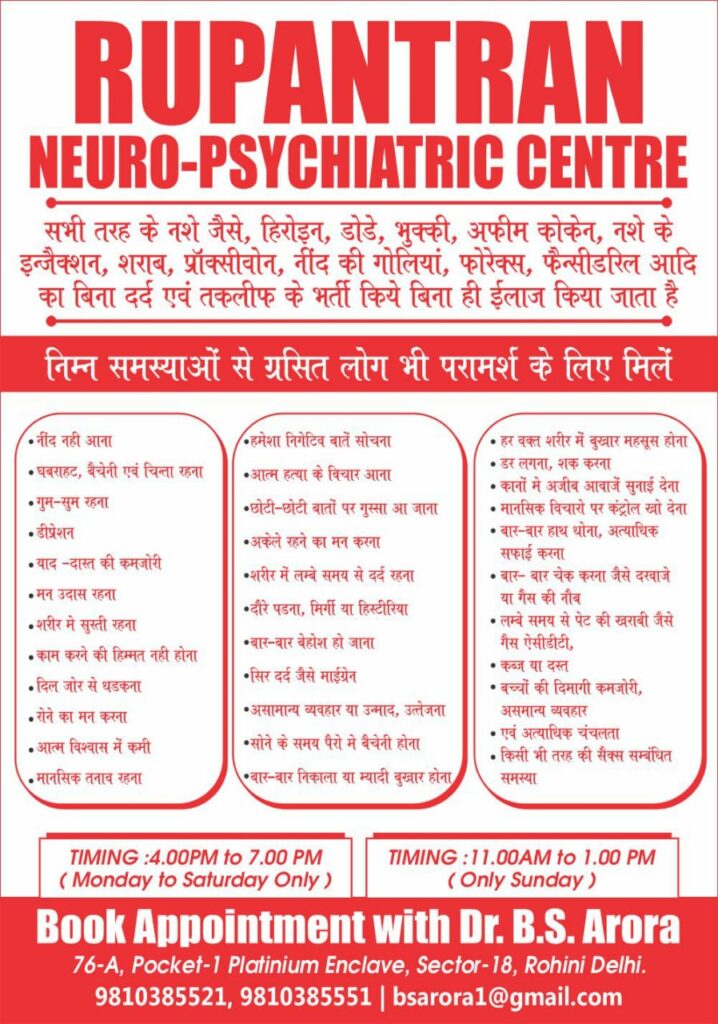The best treatment for depression may include psychological treatment, medication, and support in the community. While some people may only need psychological, ‘talking’ treatment, this blog answers commonly asked questions about antidepressant medication.
How do antidepressant medications help?
Antidepressant medications help reduce the symptoms of depression, such as: feeling extremely sad for no clear reason; loss of interest or pleasure in things you usually enjoy; sleeping too much or too little; feelings of worthlessness or excessive guilt or worry, and difficulty in thinking, making decisions or concentration. Antidepressants may also be helpful in the treatment of anxiety-related disorders, such as generalised anxiety disorder and eating disorders, obsessive-compulsive disorder, social phobia, and post-traumatic stress disorder.
Discuss with your doctor what the best treatment for your symptoms is likely to be, any side-effects as well as benefits of treatments, and other factors such as foods which may need to be avoided.

Why are antidepressant medications prescribed?
Antidepressant medication may be prescribed when symptoms are resistant to psychological treatment, are severe, or there is no access to psychological treatment.
How long do they take to work?
It can take up to six weeks after the first dose of medication before it has an antidepressant effect. For some people it can take up to eight weeks or a little longer before they start to feel better, and the maximum benefit is felt after six months. Antidepressant medication is generally very effective. Around 70% of people with major depression start to feel better with the first type of antidepressant they are prescribed.
What else do we know about antidepressants?
They don’t change your personality
While antidepressants make you feel better they do not change your personality. You may notice that you find it easier to get on with people because you feel less anxious.
They are not ‘happy drugs’
Antidepressants help relieve the symptoms of depression and associated anxiety. They do not make you euphoric, but simply help you react more realistically in your emotional responses. You may notice, for example, that you take in your stride little things that used to worry you or get you down.
They are not the only thing that helps people get better
Taking antidepressant medication is one important step in getting better but is rarely enough on its own. As well as medication, effective treatment for depression and anxiety-related disorders may include education about the illness and how to deal with it, and psychological therapies such as Cognitive Behavioural Therapy (CBT), for example. For some people, ongoing clinical support in the community, rehabilitation, accommodation and employment support are also helpful.
They are not addictive
Antidepressants, like most medications, can change the way you feel. This means that if you stop taking the medication you may start to feel the way you did before the treatment. Some people confuse this with being addicted. Antidepressants are not addictive and you will not become dependent on them. However, it is important to talk to your doctor before you stop taking them. It is always advisable to reduce the dose slowly, with close monitoring, to minimise possible discomfort as your body adjusts to the lower dose. It is also important that the medication is monitored carefully in the first couple of months, as some people may experience an increase in symptoms if the antidepressant is not effective.
What antidepressant medications are there?
There are many types of antidepressant medication available: an older group (known as tricyclics), and newer groups (known as SSRIs and SNRIs) which tend to have fewer side-effects and a wider safety margin than older ones if the wrong dose is taken.
Different medications work for different people. While there is usually a period of trial and adjustment, there are some things you and your doctor can talk over to help decide which is most likely to be right for you. Some things you should discuss with your doctor are:
Your age
These medications are not generally recommended for treatment of depression in children and adolescents, but they may be prescribed in certain circumstances. It is important to discuss this issue with the treating doctor, and ensure effects are monitored if an antidepressant is prescribed. If a child or adolescent is currently being treated with an SSRI, they should not have the medication ceased abruptly, but reduced gradually by the doctor if it needs to be stopped. People over 65 taking antidepressants may also be at greater risk of falls and fractures.
Whether you have a history of physical problems
Certain antidepressants may interact adversely with some medications for physical illnesses. That is why it is important to tell your doctor if you are on any other medication.
How severe the symptoms are
People with mild or moderate depression seem to find SSRIs and SNRIs most effective, while some people who are severely depressed may find the older tricyclics more effective.
Are there any side-effects?
As with any type of medication, some people may experience side effects. Many of these will settle down after a few weeks, when your body has adapted to the medication, while others may persist. Make sure you discuss with your doctor any side-effects such as:
- diarrhoea or constipation
- nausea
- headaches
- sleep disturbance
- lower sexual responsiveness
- dizziness or blurred vision
- weight gain
- dry mouth
- sweating
There is a lot that your doctor can suggest you do to minimise side-effects. Changing the dose can ease side-effects as can changing the time of day you take it. Some people may have their medication changed to find one that works best for them. That is why you should let your doctor know as soon as possible if you are concerned about any of these side-effects. It is also important to tell your doctor about any other medications you are taking, whether prescribed, over-the-counter or ‘natural therapies’ as they may interact with the antidepressant medication.
How do I know which one is right for me?
Choosing the best medication to prescribe is not always straightforward because the way people respond to medication is different. This means that finding the right one for you may involve trying one or more. However, there are some things you and your doctor can consider to work out what type of antidepressant medication is most likely to be right for you, including whether you have had any physical health problems and what symptoms you are having trouble with.
What about bipolar disorder?
Depression is a feature of bipolar disorder, in which a person experiences extreme moods – very ‘high’ and over-excited or very ‘low’ and depressed. The symptoms of bipolar disorder can be helped by mood-stabilising medications as well as by antidepressants. These may sometimes be used to treat depression for patients with bipolar disorder.
Will I need to take any other medication?
Certain types of drugs can be prescribed for short-term use in addition to, or instead of, antidepressants. These include:
- anti-anxiety medication to treat agitation.
- sleeping tablets to help insomnia.
How can I make sure I am taking the medication safely?
To get the most out of your medication:
Give your doctor as much information as possible
Remember to tell the doctor if you are taking any other medication, if you have any allergies, and when you wake up and go to bed. This can help them to work with you to develop a medication plan that best suits you.
Store your medication in an appropriate place
Heat and damp can affect most medications – so don’t store them in the bathroom, near a sink or in your car. Instead keep them in a box (safely out of reach of children) in your bedroom or kitchen cupboard.
Don’t share medication with other people
You should not take medication prescribed for other people, even if their symptoms seem similar. The medication prescribed to you by your doctor is individually tailored to help you; other medications may not be suitable and can have adverse affects.
Take the prescribed dose
Studies show that people who take the prescribed dose at the times recommended by their doctor are more likely to feel better than those who take too little or too much. So make sure that you follow the directions on the pack to get the best benefit from your medication.
Will I ever stop taking medication?
When medication starts working and you feel better it can be tempting to stop taking it. Like people with diabetes, high blood-pressure and asthma, many people with depression and anxiety-related disorders need to take medication as prescribed on an ongoing basis to ensure they don’t go back to feeling depressed or anxious. However, others {nd that with ongoing psychological support or having learned new ways of thinking about and coping with situations, they no longer need to take regular antidepressant medication.
Before stopping or reducing any medication it is important to discuss your reasons with your doctor, who can advise on the best ways to reduce the dose safely. Stopping antidepressant medication suddenly can cause you to feel agitated and uncomfortable, so this needs to be done step-by-step under your doctor’s supervision. Always let the doctor know if you have problems when reducing the dose, as there are ways to help minimise any discomfort you may experience in this withdrawal period.
Are antidepressants safe in pregnancy?
It is important to let your doctor know if you think you may be pregnant or if you are breastfeeding. Babies are sensitive to medication and your doctor can advise you about the safest ones to use.
How do I find out more?
It is important to ask your doctor about any concerns you have.
